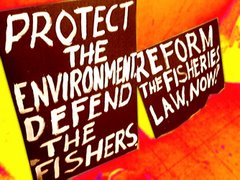
Philippine Climate Watch Alliance
#26 Matulungin St. Central District, Diliman, Quezon City
Tel.: +63 2 9248756 fax: +63 2 9209099 email:philclimatewa tch@gmail. com
Press Release
December 5, 2008
Environmentalists support the demands of small islands countries on global carbon emissions
Philippine Climate Watch Alliance (PCWA) support the demand of the 43 small islands states, the Philippines included, for industrialized nations to cut their greenhouse gas (GHG) emissions by more than 40 percent below 1990 levels by 2020 and by more than 95 percent by 2050.
"It is a positive thing that the Philippine delegation to Poznan is united with other developing nations on the level of GHG emissions reduction industrialized nations should take, " said Meggie Nolasco, spokesperson of the Philippine Climate Watch Alliance (PCWA).
The alliance is comprised of representatives of people's organizations, non-government organizations, community organizations, scientific community and environmental groups that seeks to address and discuss the issue of climate change here in the Philippines.
According to Dr. Giovanni Tapang, chairperson of the militant scientist group AGHAM and co-convenor of PCWA, "Achieving more than 40% global carbon emission cut below 1990 level by 2020 may avert the feared 2 degrees Celsius increase of global temperature, which many scientists believed will be catastrophic if not prevented. It is a realistic goal and the world has no choice if we want to avoid global disaster."
In a statement of PCWA , they urged the 43 developing countries, especially the Philippine delegates, to hold their ground as developed countries, especially the US, have tried to evade responsibility in the past.
The US, the largest emitter of GHG in the world, is the only industrialized country, which did not sign the 1998 Kyoto Protocol. Its President-elect Obama promises to reduce their carbon emission down to their 1990 levels by 2020 and 80% below 1990 level by 2050. The European Union is negotiating a 20% cut below 1990 levels by 2020.
"It should be expected that industrialized countries, particularly the United States, will impose smaller carbon emission reduction in the pre-text of protecting their economies, as they have done in the past. They might also claim that higher carbon cut targets are unrealistic," Nolasco warned.
The alliance held that industrialized nations would want to continue to exploit and consume fossil fuels in their greed for profit. This is in view of the fact that industrialized nations were the ones historically and primarily responsible in the emission and rise of greenhouse gases (GHG).
Although developed countries already gave their word to cut back on emissions, Nolasco insisted that, "Cutting back on emissions is not enough. Any genuine move to resolve the problem of global warming must critically recognize and address the larger socio-economic context in which it occurs."
"As we criticize the policies and offenses of industrialized nations, especially the US, as exacerbating the problem of global warming, the Philippine government also lacks genuine policies and programs to mitigate climate change and help communities adapt to its impacts." Nolasco pointed out.
She further expressed that, "The position of the Philippine government in the Conference of Parties in Poznan contradicts the policies of the Arroyo administration in relation to carbon emissions. The Arroyo government's economic policies such as in mining and energy, agriculture and forest is geared towards in producing and consuming more carbon-based fuels such as large-scale mining projects, coal-fired power plants, oil and gas extraction projects."
"The solution to global warming goes beyond carbon emission reduction. We should address the root cause of it, which is the unsustainable extraction and use of our natural resource particularly of fossil fuels. For a start, we can address the problem if we can oppose and stop the globalization policies of the Arroyo administration which is putting our country and people more at risk and vulnerable to climate change," Dr. Tapang ended.
Reference: Meggie Nolasco, PCWA spokesperson, 09163733275






